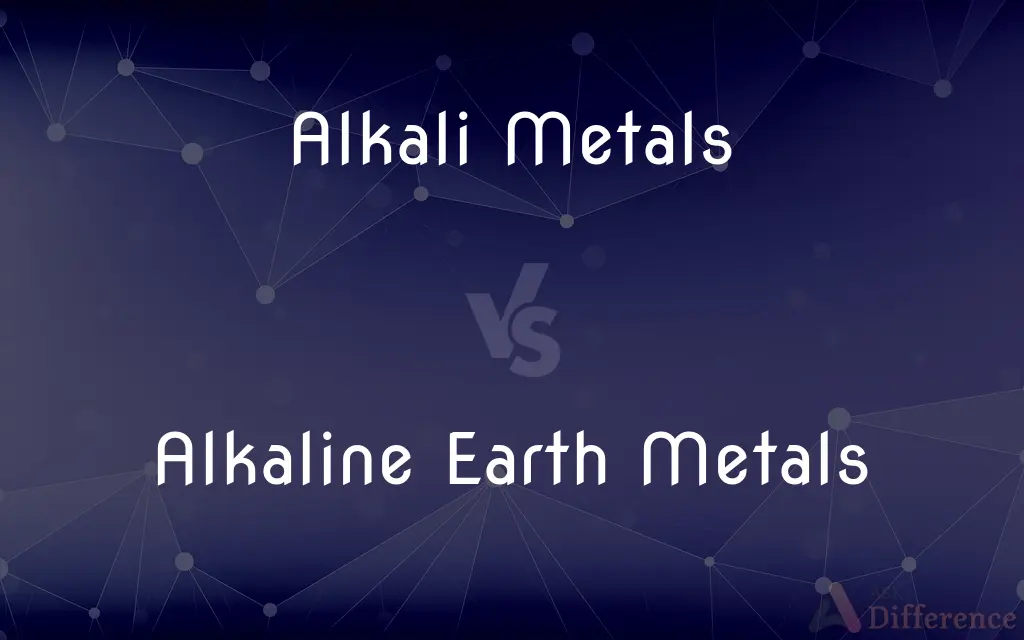Alkali Metals vs. Alkaline Earth Metals — What's the Difference?
Edited by Tayyaba Rehman — By Fiza Rafique — Published on December 10, 2023
Alkali Metals are Group 1 elements, highly reactive and have one electron in their outermost shell; Alkaline Earth Metals are Group 2 elements, less reactive and have two electrons in their outermost shell.

Difference Between Alkali Metals and Alkaline Earth Metals
Table of Contents
ADVERTISEMENT
Key Differences
Alkali Metals and Alkaline Earth Metals are both s-block elements in the Periodic Table. Alkali Metals, found in Group 1, include lithium, sodium, and potassium. These metals are highly reactive, especially with water, producing alkaline solutions and hydrogen gas. Their high reactivity stems from their single valence electron, which they readily donate to achieve a stable electron configuration.
In contrast, Alkaline Earth Metals, situated in Group 2, comprise beryllium, magnesium, and calcium among others. These metals, though still reactive, are less so than the Alkali Metals. This reduced reactivity arises from the two valence electrons they possess. Alkaline Earth Metals also react with water, but the reactions are typically slower and less violent.
Both Alkali Metals and Alkaline Earth Metals are soft, metallic elements with low melting points. However, the melting points of Alkaline Earth Metals are generally higher than those of Alkali Metals. Additionally, Alkali Metals are larger and have lower ionization energies compared to Alkaline Earth Metals. This means that Alkali Metals lose their single valence electron more readily, making them more reactive.
The distinct characteristics of Alkali Metals and Alkaline Earth Metals play a pivotal role in their applications. Alkali Metals, for instance, are used in rechargeable batteries and photoelectric cells. Alkaline Earth Metals find applications in fireworks, flares, and the production of certain alloys. Both groups, however, are essential in the chemistry realm, showcasing the diverse nature of elemental properties.
Comparison Chart
Group in Periodic Table
Group 1
Group 2
ADVERTISEMENT
Number of Valence Electrons
1
2
Reactivity
Highly reactive
Reactive but less than Alkali Metals
Reaction with Water
Vigorous and explosive
Slower and less violent
Typical Applications
Batteries, photoelectric cells
Fireworks, flares, alloys
Compare with Definitions
Alkali Metals
Elements that have low melting and boiling points among metals.
Francium, although rare, is an Alkali Metal that would have a low melting point.
Alkaline Earth Metals
Elements with two valence electrons, contributing to their characteristic properties.
Magnesium, an Alkaline Earth Metal, is crucial in numerous biological processes.
Alkali Metals
Soft metals that are readily cut with a knife.
Potassium, part of the Alkali Metals group, is so soft that it can be molded by hand.
Alkaline Earth Metals
Reactive metals found in Group 2 of the Periodic Table.
Calcium, an Alkaline Earth Metal, is vital for bone health.
Alkali Metals
Highly reactive metals in Group 1 of the Periodic Table.
Sodium, one of the Alkali Metals, reacts explosively with water.
Alkaline Earth Metals
Metals with a somewhat higher melting point compared to Alkali Metals.
Beryllium, an Alkaline Earth Metal, finds use in various aerospace applications.
Alkali Metals
Metals that produce alkaline solutions upon reacting with water.
Rubidium, an Alkali Metal, forms a basic solution when it contacts water.
Alkaline Earth Metals
Metals that are harder than Alkali Metals but remain relatively soft.
Strontium, an Alkaline Earth Metal, has applications in fireworks.
Alkali Metals
Elements with one valence electron, leading to high reactivity.
Lithium, an Alkali Metal, is used in rechargeable batteries due to its reactivity.
Alkaline Earth Metals
Elements that form alkaline solutions but at a slower reaction rate with water compared to Alkali Metals.
Barium, despite being an Alkaline Earth Metal, should be handled with care due to its reactive nature.
Common Curiosities
Why are Alkali Metals so reactive?
Alkali Metals have one valence electron, which they easily lose, making them highly reactive.
Are Alkaline Earth Metals as reactive as Alkali Metals?
No, Alkaline Earth Metals are reactive but less so than Alkali Metals due to their two valence electrons.
Where are Alkaline Earth Metals located?
Alkaline Earth Metals are situated in Group 2 of the Periodic Table.
What are Alkali Metals?
Alkali Metals are highly reactive metals found in Group 1 of the Periodic Table.
Why are Alkali Metals used in batteries?
Their high reactivity and tendency to lose an electron make Alkali Metals suitable for use in batteries.
Can Alkaline Earth Metals be found in daily products?
Yes, magnesium, an Alkaline Earth Metal, can be found in products like fireworks and flares.
Can Alkali Metals be found in nature in their pure form?
No, due to their reactivity, Alkali Metals are not found in nature in their elemental form.
How do Alkaline Earth Metals react with water?
Alkaline Earth Metals react with water to produce alkaline solutions, but the reactions are slower than those of Alkali Metals.
How many valence electrons do Alkali Metals possess?
Alkali Metals have one valence electron.
Are Alkali Metals soft?
Yes, Alkali Metals are soft and can be cut with a knife.
Which is more abundant, Alkali Metals or Alkaline Earth Metals?
Both are commonly found, but the abundance varies; for instance, sodium (an Alkali Metal) is more abundant than beryllium (an Alkaline Earth Metal).
What distinguishes Alkaline Earth Metals from Alkali Metals in electron configuration?
Alkaline Earth Metals have two valence electrons, while Alkali Metals have one.
Do Alkaline Earth Metals have health implications?
Yes, for instance, calcium, an Alkaline Earth Metal, is essential for bone health.
Do Alkaline Earth Metals have high melting points?
Relative to Alkali Metals, Alkaline Earth Metals have somewhat higher melting points.
Why are Alkali Metals stored under oil?
To prevent their reaction with moisture and air, Alkali Metals are stored under oil.
Share Your Discovery

Previous Comparison
IFSC Code vs. NEFT Code
Next Comparison
Peer to Peer Network vs. Client Server NetworkAuthor Spotlight
Written by
Fiza RafiqueFiza Rafique is a skilled content writer at AskDifference.com, where she meticulously refines and enhances written pieces. Drawing from her vast editorial expertise, Fiza ensures clarity, accuracy, and precision in every article. Passionate about language, she continually seeks to elevate the quality of content for readers worldwide.
Edited by
Tayyaba RehmanTayyaba Rehman is a distinguished writer, currently serving as a primary contributor to askdifference.com. As a researcher in semantics and etymology, Tayyaba's passion for the complexity of languages and their distinctions has found a perfect home on the platform. Tayyaba delves into the intricacies of language, distinguishing between commonly confused words and phrases, thereby providing clarity for readers worldwide.












































